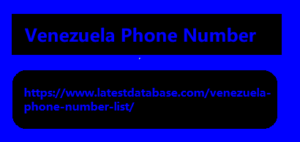Post by account_disabled on Mar 5, 2024 3:58:44 GMT -5
If you are starting a new small business or similar entrepreneurial venture, creating your brand will be one of the most critical steps you will face. Your website is the fundamental cornerstone of your brand. SEO is what will allow your web page to rank higher on the results pages of search engines like Google and Bing . This will make it easier for people to find your brand online. And it is precisely when launching a brand new website that SEO becomes a determining element of the success of a brand. According to our State of Content Marketing Report , attracting more traffic is a top goal for marketers: around 71% hope to bring more consumers to their websites. If done well, SEO can reduce customer acquisition costs, making it an attractive avenue for businesses looking to grow without breaking the bank.
For startups this is crucial: with SEO you don't have to spend huge Venezuela Phone Number sums of money to promote new websites and attract more consumers interested in your brand. The following checklist is a perfect checklist for beginners dealing with new web projects. Let's analyze what the best SEO tips for new websites are: 1. Choose a concise and effective domain name 2. Outline the structure and architecture of your site 3. Decide whether you want to build the site yourself, use outside help or a mix of both 4. Create content before launch and outline a calendar of future content 5. Prioritize on-site and off-site SEO for new websites 6. Learn to track and analyze before your site goes live 7. Stay up to date on SEO best practices by following industry blogs 1. Choose a concise and effective domain name Your domain name should be well aligned with your brand and provide insight into your business products or services to your target audience.

It should be short, simple and easy to remember. You need to make it as easy as possible for your current and future customers to recall your domain. Penny Hoarder is a great example. The name of this personal finance blog is catchy and easy to remember, and leaves no doubt about the type of content you will find inside. The domain name is also an important ranking factor. Search engine crawlers examine the domain name to understand what a web page is about. Ideally, your domain name will also include a main keyword that you want your website to rank for. Keywords reflect a user's search intent and are how users find your platform through Google and other search engines. Use an SEO tool to choose winning keywords for your content and page titles. Finally, your domain name must be unique. You can check if a particular domain is already in use online . You can also use this tool to brainstorm potential domain names.
For startups this is crucial: with SEO you don't have to spend huge Venezuela Phone Number sums of money to promote new websites and attract more consumers interested in your brand. The following checklist is a perfect checklist for beginners dealing with new web projects. Let's analyze what the best SEO tips for new websites are: 1. Choose a concise and effective domain name 2. Outline the structure and architecture of your site 3. Decide whether you want to build the site yourself, use outside help or a mix of both 4. Create content before launch and outline a calendar of future content 5. Prioritize on-site and off-site SEO for new websites 6. Learn to track and analyze before your site goes live 7. Stay up to date on SEO best practices by following industry blogs 1. Choose a concise and effective domain name Your domain name should be well aligned with your brand and provide insight into your business products or services to your target audience.

It should be short, simple and easy to remember. You need to make it as easy as possible for your current and future customers to recall your domain. Penny Hoarder is a great example. The name of this personal finance blog is catchy and easy to remember, and leaves no doubt about the type of content you will find inside. The domain name is also an important ranking factor. Search engine crawlers examine the domain name to understand what a web page is about. Ideally, your domain name will also include a main keyword that you want your website to rank for. Keywords reflect a user's search intent and are how users find your platform through Google and other search engines. Use an SEO tool to choose winning keywords for your content and page titles. Finally, your domain name must be unique. You can check if a particular domain is already in use online . You can also use this tool to brainstorm potential domain names.
